To anyone who may have heard loud hooting and hollering coming from a flying black rocket on the Don Valley Parkway south of Queen St. this morning, I’m sorry. I’m pretty sure no one could hear the gleeful cheering through my helmet or above the wind noise, but if you did, I apologize.
I was just having too much fun during my commute to downtown Toronto. With a wide open lane ahead of me and the throttle pinned wide open, I just couldn’t help but whoop it up as the number on the digital speedometer kept rising.
I also want to apologize to all the other motorcyclists out there for dispelling the theory that anyone riding a motorcycle is automatically cool. Forgive my nerdy exuberance and blame it on my lack of experience.
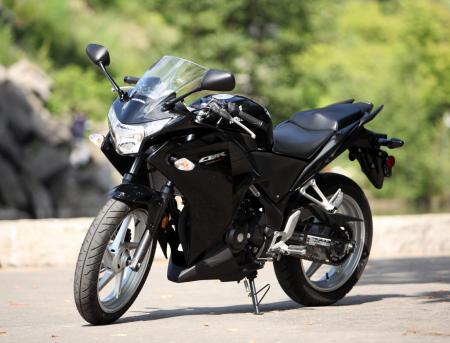 You always remember your first. In my case, my first ride was the new 2011 Honda CBR250R. |
First Ride
This review is a little different from the typical reports from our more experienced gang ofMotorcycle.com editors. Kevin, Pete, Tom and Troy have years of riding experience on a wide variety of motorcycles.
My own experience was limited to riding modified Yamaha Virago 250 cruisers (a.k.a. the V-Star 250) on a closed course at the Humber College Motorcycle Rider Training Program (if you haven’t read the Rider Training report yet, here’s your chance!), so I don’t have the same basis for making comparisons.
When I picked up the CBR250R from Honda Canada headquarters, it was my first time on the road with a real, street-legal motorcycle, making this a literal “first ride” report.
Following the motorcycle industry as I have, and reading several anecdotal reports on online forums, I’ve read countless stories of new riders crashing their bikes riding home from the dealership. These tales may or may not be urban myths based on a few isolated cases, but they were foremost on my mind. I made sure I was prepared. I’ve been through rider training and I wore all my protective gear.
I also enlisted the help of my friend to drive me up to Honda HQ and follow me home, something I think every new rider should consider when picking up his first bike. It helped that my friend, Paul Marissette, is a law enforcement officer, so I had an actual police escort, but it’s good to have someone along to create space in traffic around me and help if I get into any trouble.
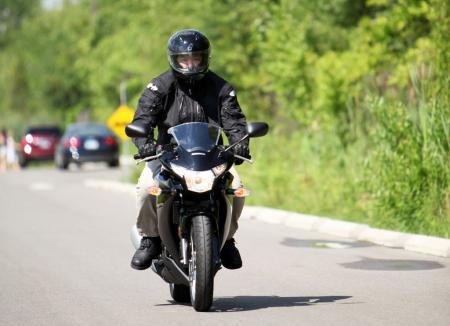 The rider training program taught me a lot of the important things about riding a motorcycle but little details like how to adjust the mirrors or cancel a turn signal I had to learn for myself. |
Climbing onto the saddle for the first time, I took a moment to become familiar with the controls. The Viragos at Humber did not have turn signals, so I took care to learn how to activate the CBR250R’s signals with my thumb. Years of car driving experience taught me to cancel my signals by flicking the switch the opposite direction, but it took me some time to get used to pushing a button to turn off the blinker. The horn button is positioned just below the turn signal switch, and even after weeks of riding, I still occasionally give out a honk when I’m trying to cancel a turn signal. That’s something I will have to get used to with time.
The CBR250R is fuel injected so I didn’t have to fiddle with a choke, one less thing for me to worry about. The mirrors however took a while to position correctly. Looking at the two mirrors at the end of long stems attached to the fairing, it immediately struck me how much smaller they are compared to those found on a car.
The footpegs are in a fairly neutral position, compared to the feet-forward cruiser positioning on the Virago. This felt more natural to me, personally, though I can see how a seating position similar to sitting in a car might be helpful to other new riders. It did take me a little while to adjust to the new foot position. With the Virago, I could keep my toe hovering comfortably over the rear brake control but as Paul told me after I arrived safely at home, trying to do that on the CBR250R, I was often riding with the brake light on as my toe pressed slightly on the pedal. Another adjustment I needed to make.
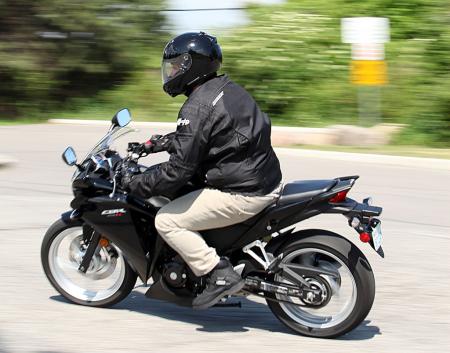 It wasn't until I saw photographs of myself that I realized how small the CBR250R looks. From the saddle, it doesn't look small at all. |
The handlebars are in a comfortable position and I could sit rather straight in the saddle. This gave me a good vantage point to view traffic around me, and I could easily see over a car in front of me, something I could not do driving in my Nissan.
The ride home was careful and deliberate, with light traffic and few turns, especially left turns. There was one near panic moment during one left turn however. I was in the middle of the intersection waiting for an opening to make my turn. A car was travelling quickly in the approaching lane when the light turned amber.
At first, I thought the car would try to run through the light, but I was caught off-guard when the driver came to a quick stop. I started to move forward but let the clutch out too quickly and stalled the engine, right in the middle of the intersection with the light changing. Fortunately, the other drivers around me were patient and I was able to restart the engine quickly and complete the turn, even if it was done rather sheepishly. Again, I apologize for dispelling the Cool Biker mythos.
Every Day is Ride to Work Day
After a weekend of practicing on small residential streets and making short trips around town, I was ready to ride the CBR250R to work for the first time. Typically, if I was driving to work, I would take the freeway all the way to the office, but I knew I was not ready to attempt riding on expressways yet. Instead, I plotted out a new route through city streets, and I stumbled upon a gem of a road.
Bayview Avenue is a popular thoroughfare for motorcyclists. Running alongside of the Don River opposite the Don Valley Parkway, Bayview is a long, scenic road with sweeping curves, several elevation changes, few intersections and surprising little traffic. It is also one of the few city streets in Toronto with a speed limit of 70 kph (43 mph), as most roads are limited to 60 kph (37.3 mph). Taking this route for the first time, I immediately saw the appeal for bikers, and I saw several other riders traveling on Bayview in both directions. I was able to ride at a good clip and the ease at which I was able to lean the CBR made the ride a heck of a lot of fun.
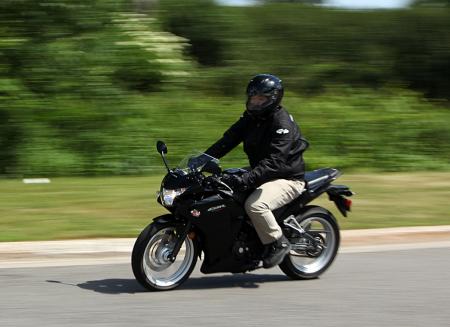 I didn't think I would ever say this but commuting to work is actually fun when you're on a bike. |
As much fun as Bayview provided, its one biggest flaw was that it didn’t lead directly to the front door to the office. Bayview took me most of the way downtown but I still had to take a slower, busier street to get through the downtown core. With more cars, several intersections, and following behind a tram making frequent stops, the final mile to the office was very slow going.
But this was the kind of riding a bike like the 250 was good for. With power peaking at 22.6 hp, the CBR has enough juice for stop-and-go riding. A larger, more powerful motorcycle would probably feel more frustrating to ride in this scenario. The clutch is easy to control, and frequent shifting in and out of first gear is not a problem.
When I finally arrived at the office, I checked my watch and was surprised, even with that slow final stretch, it took me about 45 minutes to make the 20-mile commute, about the same amount of time it would take for me to drive to work taking the freeway all the way to the downtown core. Because motorcycle street parking is free in Toronto, I was able to park quickly, and conveniently, right across the street from the office. If I drove my Nissan Altima to work, I would have to spend about few more minutes finding a parking lot that still had space, not to mention fork over $12 to $15 in parking fees.
Life is a Highway
One of the biggest concerns I had about the CBR250R was how it would handle the high speeds of freeway cruising. And it wasn’t just me. Talking to my friends and family members, I heard several variations on a common theme: “you’re not going on the highway with that, are you?”
Well I did, eventually, as illustrated by my exploits on the Don Valley Parkway, a 90 kph (56 mph to you Yanks) expressway running from the suburbs to downtown Toronto. The CBR250R is more than capable of keeping up with the speed of traffic.
Reaching 60 mph requires very little effort, and that’s with my 240-pound girth, riding gear and a backpack. Climbing to 70 mph requires some work but is easily manageable, while the windscreen did its job capably. In full flight, I reached a speed of just over 80 mph before the wind and vibration through the handlebars became more of an issue. I could have probably pushed it to the mid- to high-80s, but as a new rider I knew I was approaching my limit before the CBR250R did.
Fuel Sipper
One of the best things I like about riding so far is filling up the gas tank and still getting change back for a $10 bill. I kept track of my fuel usage through the few weeks I rode the CBR250R, and admittedly, the fuel economy figures for my first week was about 40 mpg, a big improvement from my Nissan’s 23 mpg, but fairly pedestrian for a motorcycle. Of course, it didn’t help I was still getting used to riding and shifting gears manually, plus I spent a lot of time stuck in traffic in the city with the engine idling beneath me.After more time and experience, and adding highway travel to my repertoire, my fuel economy figures improved dramatically. With a mix of highway and city streets, I was able to get 64 mpg, nearly three times better than the Altima.
The Honda CBR250R has a digital fuel gauge with six bars indicating a full 3.4-gallon tank. Each bar therefore represented about 0.57 gallons of gas. While the fuel gauge provided a good estimate on how much fuel I had left, I found it a little inaccurate at times. Often, when I turn the CBR on, the fuel gauge would show one bar less than it did when I parked the bike. I had left the motorcycle in my garage one night with two bars on the gauge but when I got ready to ride in the morning, the fuel gauge was down to one bar and it was flashing. As I made my way to a nearby gas station, the gauge went back up to two bars.
Fuel gauge accuracy appears to be a common issue for a lot of riders, and many motorcycles don’t even have a fuel gauge. For a new rider, having a fuel gauge is important as there are already a lot of other things to keep in mind without having to worry about keeping track of mileage and fuel use, so I should be thankful the CBR250R at least has a gauge, but I could do without worrying about that final blinking bar.
Final Thoughts
I have to admit it. I’ve caught the bug. I love riding, and I miss it when I can’t ride.
There was a slight incident during my time with the CBR250R. I returned to the CBR at the end of the workday and I realized someone had tipped the bike over during the day before putting it back upright. The left mirror and turn signals had some superficial damage and there were a few scruff marks on the fairing.
The clutch lever however, was bent outwards. Mechanically, there was no problem with the bike, though it was uncomfortable to use the clutch lever the way it curled away from my fingers. I had to bring the CBR into Honda for a check-up and a clutch lever replacement. That left me without a motorcycle for a short time.
And boy did I miss it.
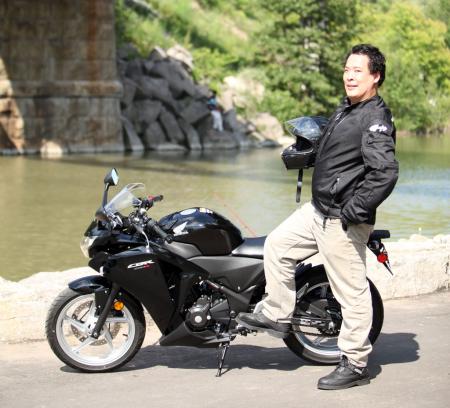 I'm going to miss the little CBR250R after I return it. |
Even worse, the weather was a lot nicer than it was when I had the bike. There wasn’t as much rain or humidity and temperatures were actually cooler in Toronto in the early summer than late spring. And there I was, back on public transit, packed with all the other sardines.
I was glad to be re-united with the CBR250R and its new clutch lever, but the time away made me realize how much I wanted to ride again. It’s going to be hard to return the CBR250R to Honda.
I guess it’s time to go bike shopping for real now.
Source : motorcycle.com








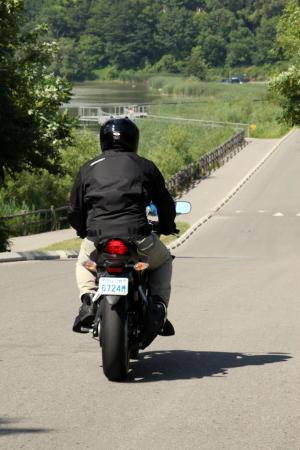
0 comments:
Post a Comment